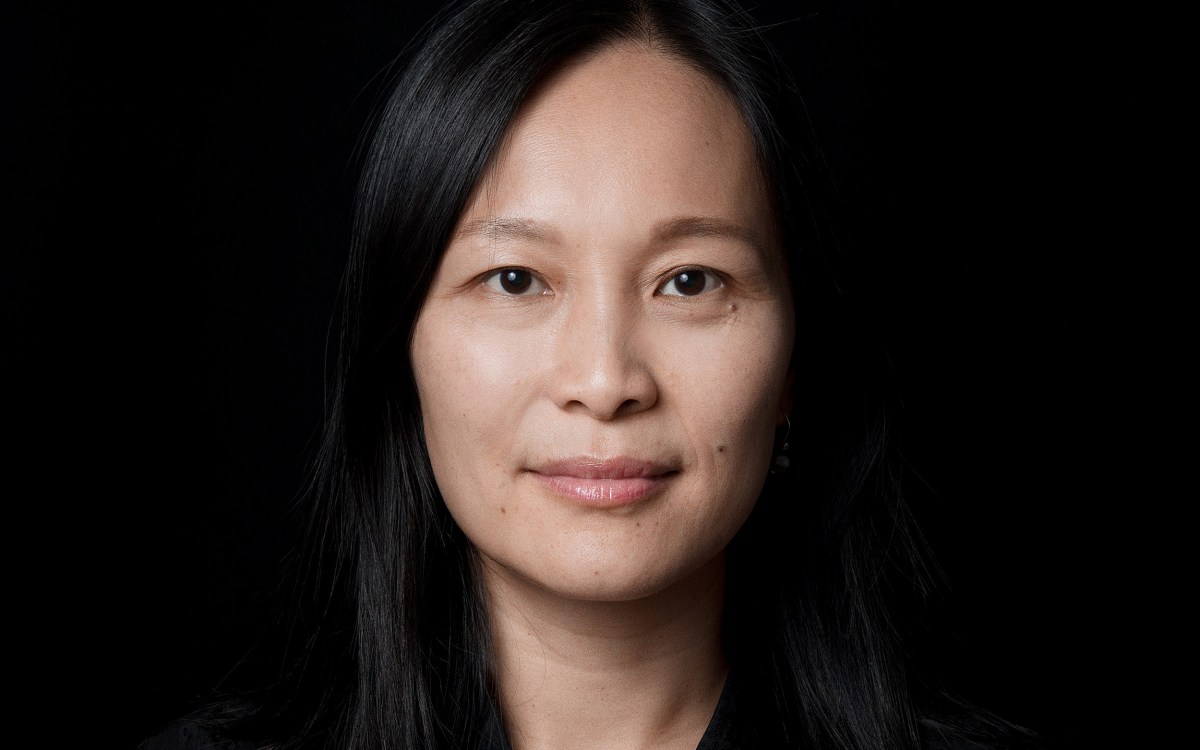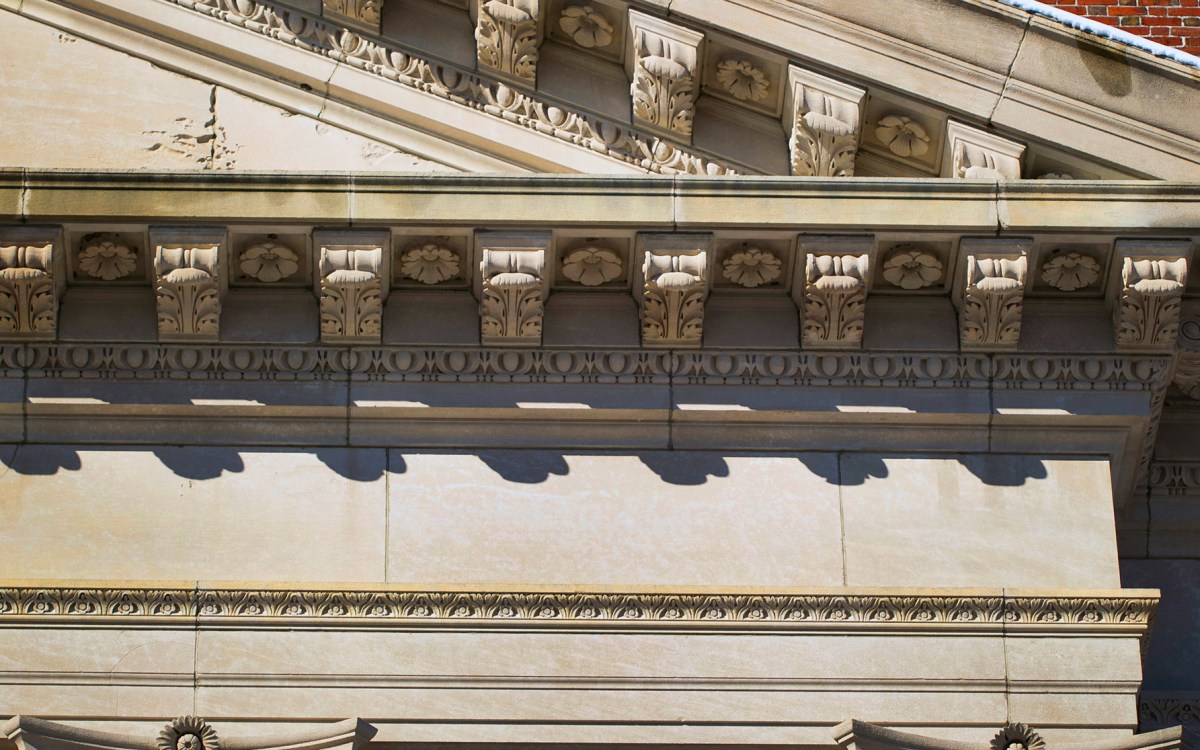A new way for graduates to connect and find inspiration
Alumni association executive director talks about rethinking alumni weekend and embracing an inclusive future
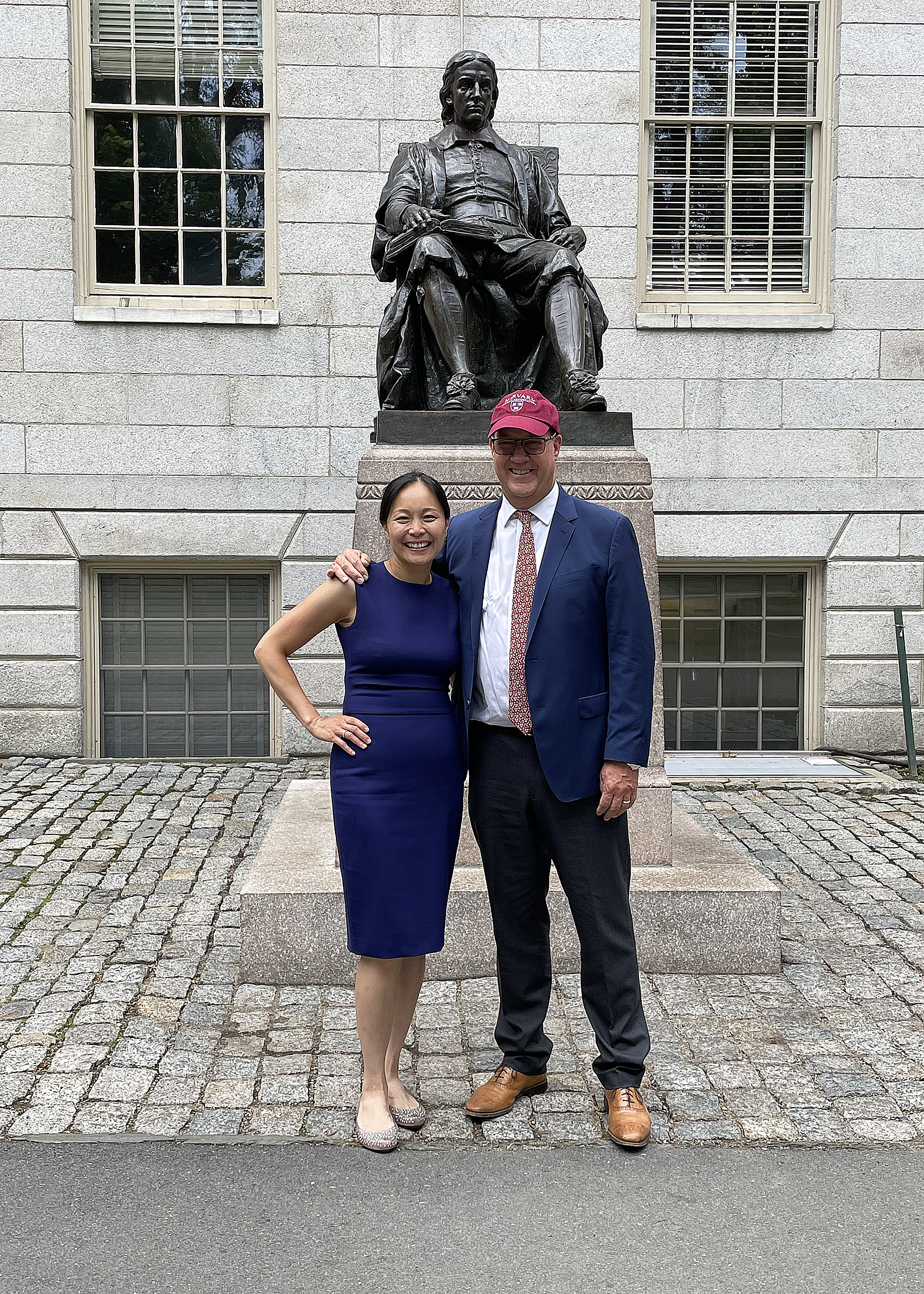
“I am thrilled that we will be welcoming alumni back to campus and to a new annual meeting, one that brings together graduates from across the University and is focused singularly on recognizing and saluting all of the important ways alumni give back to Harvard and to the world,” said current Harvard Alumni Association President Vanessa Liu with HAA Executive Director Philip Lovejoy.
Photo by John Prince
The pandemic upended plans, but it also inspired innovation and involvement for members of the Harvard Alumni Association (HAA).
This summer’s 151st Annual Meeting was held virtually for the first time, a gathering made possible thanks to months of collaboration between the HAA and thousands of alumni volunteers on developing new ways to connect and celebrate. A stunning 18,000 gathered to honor alumni service and impact, with alumni from more than 150 countries represented — a reflection of deepened global engagement from alumni, including a significant number who connected with fellow grads for the very first time.
Now the organization is taking stock as it continues to prepare for another year of connecting alumni and a new way for reunions and the annual meeting to take place. Earlier this year, the HAA announced that Harvard and Radcliffe College Reunions would include both virtual and in-person programming and events throughout the year, culminating in a week of on-campus celebrations the week following Commencement, with the annual meeting on June 3.
“This is an exciting moment and a grand opportunity for all of us,” said Vanessa Liu ’96, J.D. ’03. “I am thrilled that we will be welcoming alumni back to campus and to a new annual meeting, one that brings together graduates from across the University and is focused singularly on recognizing and saluting all of the important ways alumni give back to Harvard and to the world. Coming together also provides a forum for collective action — and I can’t wait to see what comes of that.” Liu, who celebrated a College reunion last year, said she’s also eager to see how alumni reimagine the reunion experience this coming year.
Philip Lovejoy, executive director of the HAA, calls this a once-in-a-century opportunity to take a fresh look at how alumni can come together. Lovejoy recently spoke to the Gazette about what inspired him over the last year and half, how alumni and the HAA have adapted, and why he’s excited for the year ahead — and beyond.
Q&A
Philip Lovejoy
GAZETTE: Harvard’s alumni community is made of up almost 400,000 members from across the world. How does the HAA grow and evolve with that community? What have been important guide stars and adaptations for the HAA in its work with this ever-growing, rapidly changing community?
LOVEJOY: The mission of the HAA has always been and continues to be to connect alumni to each other and to the University, for the benefit of each other as well as the University, since, after all, the true strength of the University is its people. I see this every day with our alumni.
In everything we do, we try to think about how we can enhance connection and understanding, including making sure all alumni can thrive within this extraordinary network of individuals and truly feel like they belong and can be active members. This happens with the help of thousands of dedicated volunteers; the HAA is very focused on supporting and empowering those volunteers to create communities of alumni to fulfill our mission.
We are a growing, evolving community in that every year we add about 6,000 new members who are representative of society and the world at large. It is a community that is diverse, in all aspects of that word, that spans the ages of 21 to 100 and up. So, we have to be an adaptive and responsive organization, because our population is continually changing. That means listening closely to how we can meet their needs, including those of our emerging alumni populations. But it’s more than that. Our alumni help us drive change in important ways. They help us understand the ways that people want to connect. For example, not everyone wants to connect through the structures we’ve historically had in place, like Clubs. They’re looking for other options. We also have to maintain what works for our older populations. There’s so much we learn from alumni across the spectrum.
GAZETTE: Recently, President Larry Bacow praised alumni for the many ways they responded to the pandemic in communities all over the world. What did you see from your vantage point?
LOVEJOY: President Bacow often talks about the obligation of our alumni to give back, having had the privilege of attending Harvard — giving back to the University but also to society. He’s praised, and rightly so, how alumni stepped up, from helping students during the pandemic to securing personal protective equipment for first responders. Alumni have been active in their hometowns and supported critical organizations. The work they’ve done runs the gamut and has touched communities big and small, near and far: from delivering food to those who need it most, to participating in research efforts and volunteering in hospitals, to spearheading public health campaigns. They have worked on the vaccine and on vaccine awareness, not to mention serving on the front lines.
We’ve also seen alumni come together in order to give back and move things forward. We saw it in the work that we did around the climate crisis. That programming was across multiple organizations, University wide, and involved students. Our anti-racism work was begun by group of volunteers who came together and drove forward to create more awareness of this critical issue. There’s such potential implicit in this community, and we saw it start to really emerge in a new way. Now we need to keep that going in a post-pandemic world.
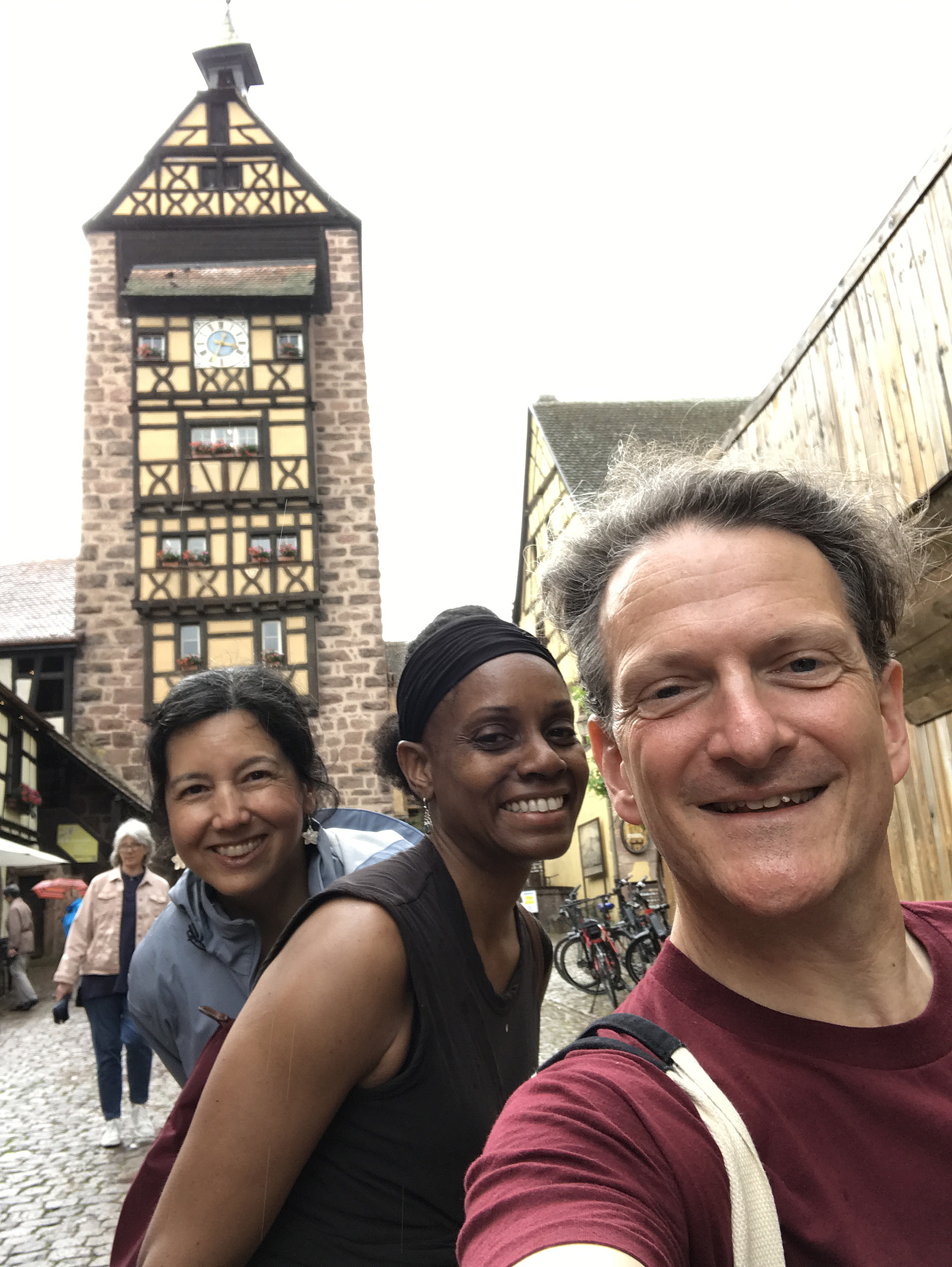
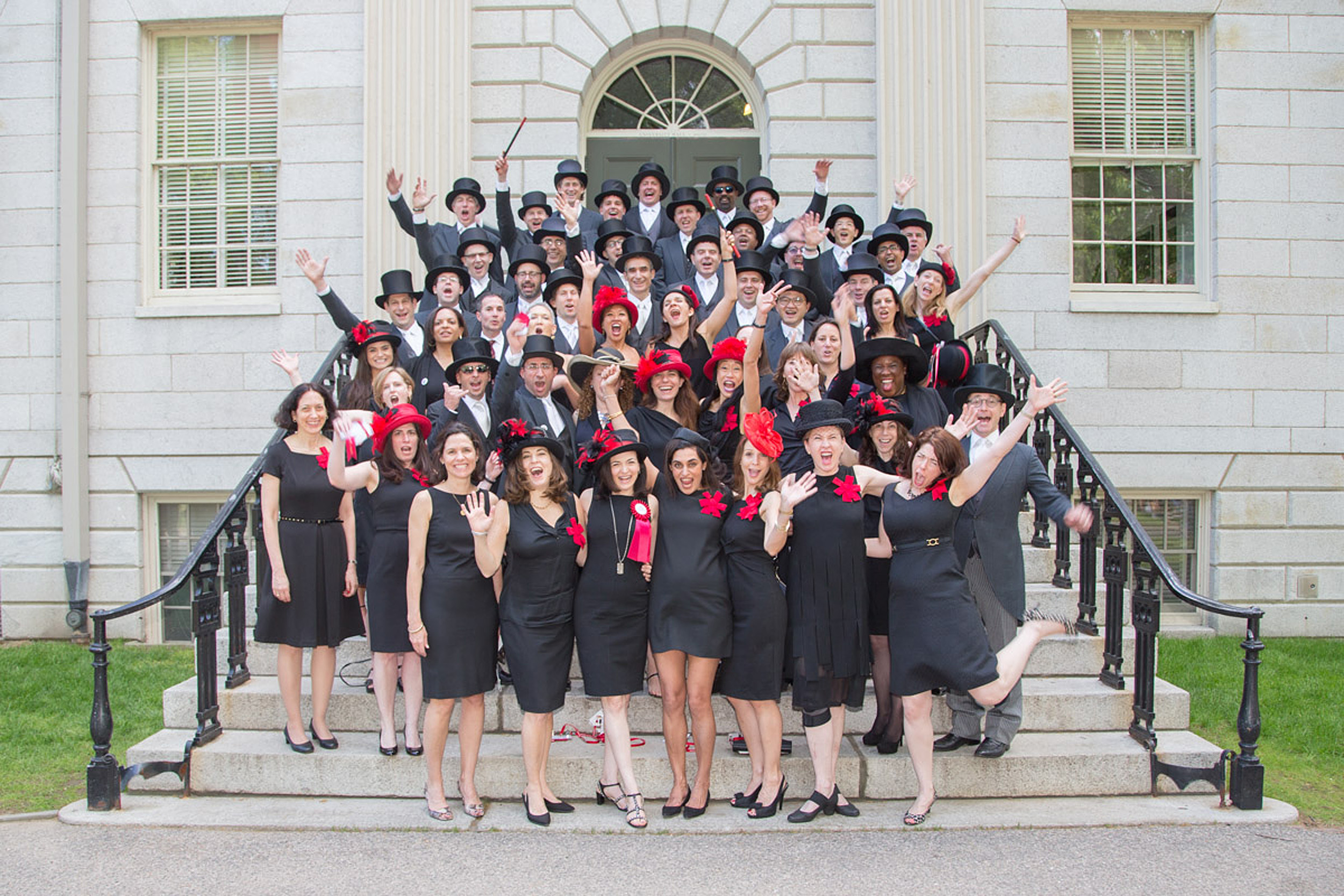
For this year’s annual meeting, alumni shared images of themselves from their homes and in their communities. John Felitti with Judith Williams and Birthe Lauchengco, all A.B. ’91, in Alsace, France. The Class of 1991 in 2016 on the steps of University Hall.
Photos courtesy of John Felitti and HAA
GAZETTE: What role does coming together through reunions play in Harvard’s alumni community?
LOVEJOY: Reunions mean the world to our alumni, and it’s amazing to me the amount of heart and soul that our volunteers put into creating these experiences for their classmates. Reunions bring them back to their student experience. I also hear many stories about alumni creating new friendships at their reunions with people in their class they had not met before, building lifelong relationships as a result.
Reunions are not just about strengthening connections to each other, but they also help alumni see and understand the Harvard of today — and the role that Harvard can and does play in our world. They see and hear from their classmates who are having an impact in their communities, and even on a global scale, doing really important work in a whole range of areas. That then drives action. Take, for example, ClassACT HR ’73, an alumni organization that addresses local, national, and international problems. That arose from members of the Class of 1973 after their 40th reunion; they all got together and heard about the incredible work that people were doing around problems like hunger, women’s rights, and other issues. They said, “We have a lot of potential within the context of this class to bond together and make connections,” which is beyond the writ of what we in HAA could do, but it’s exactly the kind of activity we want to see happen when alumni come together. ClassAct ’73 is now taking root across the classes. There are always sparks like that.
Alumni always push us to be the best version of ourselves, but reunioning alumni are usually pleasantly surprised by what’s happening on campus. In particular, they talk about belonging and inclusion. Campus today is so radically different than it was in the past, and alumni — particularly alumni of color and LGBTQ alumni — see a place that’s changed significantly for the better. That also translates into one of the real motivators for us right now, which is ensuring that the kind of work that’s happening on campus around inclusion and belonging extends into the alumni community, so that our community is a place where all alumni feel they belong, have a place, and can be heard and seen and really partake of this incredible network.
GAZETTE: This year the annual meeting was virtual and took place a week after commencement. Can you give us a report?
LOVEJOY: Knowing we weren’t going to be able to come together in person this year again, a virtual annual meeting really gave us an opportunity step back, to really think about what an annual meeting of the Alumni Association should be. It was very clear it should be celebrating this extraordinary community. Without it being tethered to commencement, we could do things differently. We could choose our own speaker, and the HAA executive committee chose Kevin Young, the new director of the Smithsonian’s National Museum of African American History and Culture as well as an accomplished poet. His speech was extraordinary. He talked about the need to learn from history and how to make connections and how to lead in polarized times.
We also decided to highlight alumni having an impact around the world. What struck me the most was the global welcome video that we put together. It was all about bringing alumni together virtually around the world to welcome everybody to this meeting. It was such a great visualization of what this community is all about. It was pretty moving to watch.
Commencement is a day to celebrate the accomplishments of the students with their families and starting them out on the lines right outside the academy. The annual meeting is to celebrate our community of alumni. I think they can better serve their purposes at different times.
Harvard Alumni Association Executive Director Philip Lovejoy shares his upcoming plans for the global alumni community.
Rose Lincoln/Harvard file photo
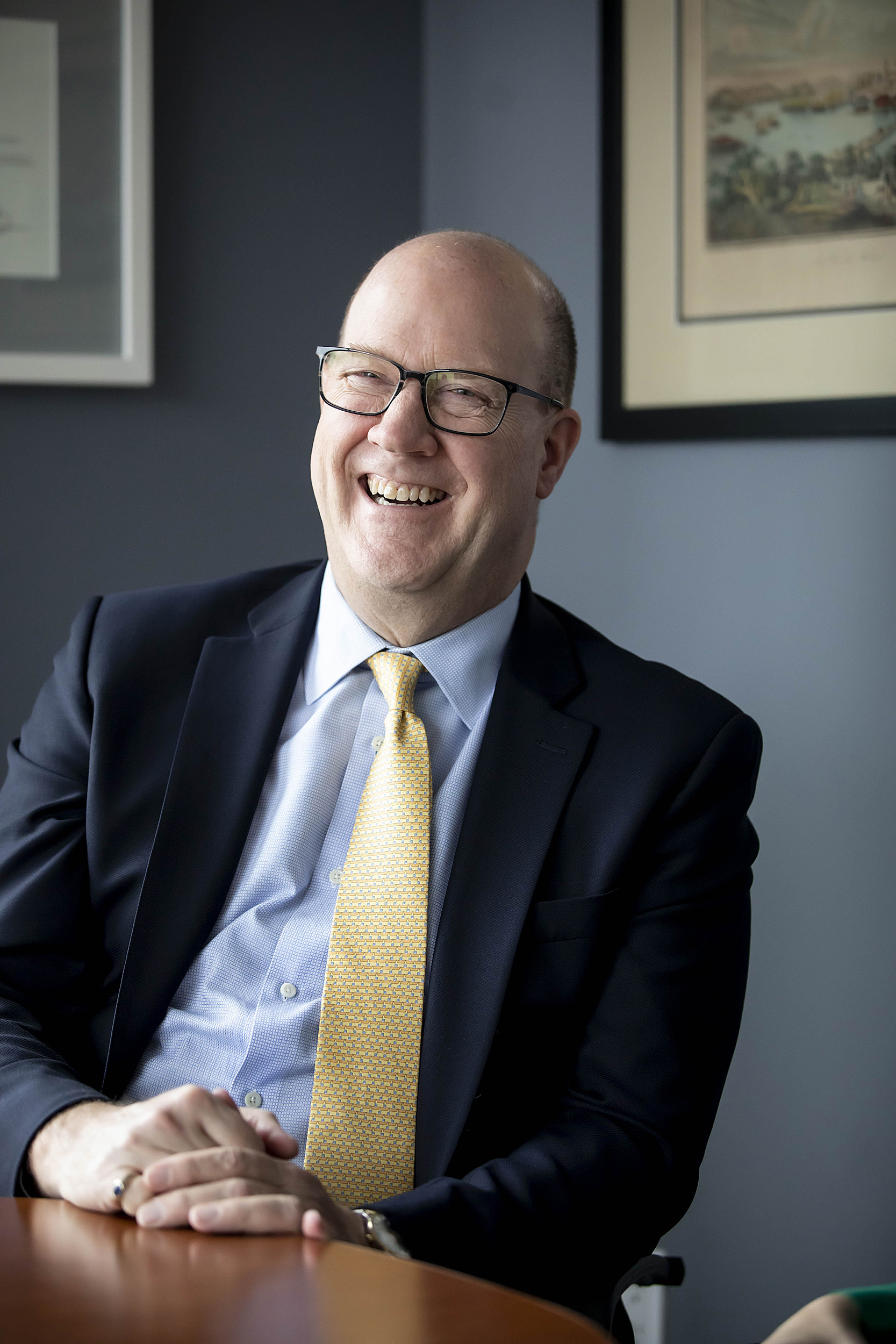
GAZETTE: Coming back to campus physically, what does that mean for alumni?
LOVEJOY: Everybody’s looking forward to being back on campus. But I should add that over the past year, we learned so much, including the power of — and appetite for — connecting digitally. We added connection points throughout the year where they could reconnect and hear from University leaders from President Bacow to Provost Alan Garber to Dean of the College Rakesh Khurana. The amount of activity and programming across all these classes was mind-blowing. They have organized panels with doctors treating COVID-19 and with experts in environmentalism, have invited faculty to speak on topics like artificial intelligence and equality and opportunity in America, and they created new ways to convene socially and to network.
Some chose to do an event every few weeks throughout the year. Some did more of a cluster of events closer to the traditional reunion time. There was very positive feedback from alumni! It was nice in this time of craziness to be able to connect.
I think particularly these reunion classes are so excited to be coming back. I’m excited because in this newly re-envisioned approach, the campus will be ours for those five days. The students will have left, summer school won’t have started yet, and so spaces will be more easily accessible. We’ll be able to really celebrate our alumni the way that they should be celebrated. They will be able to use and experience campus with a freer rein than in the past, not competing with graduating students moving out, families, all of these challenges. We’re envisioning some new campus activities for reunion classes, and I think the annual meeting is going to be a lot of fun — we’ll have a true alumni parade that can just march its way and celebrate. And then we’ll be back!



